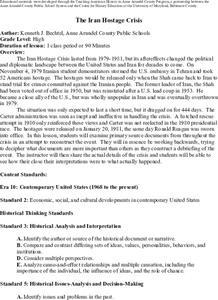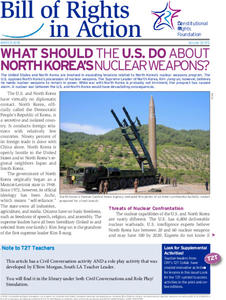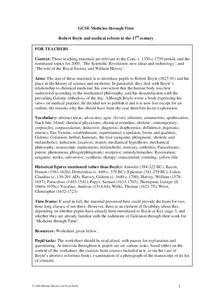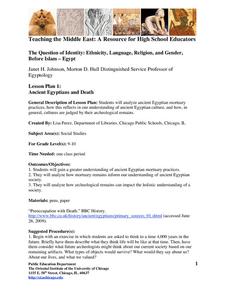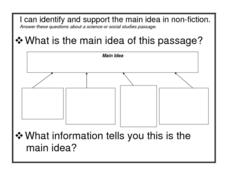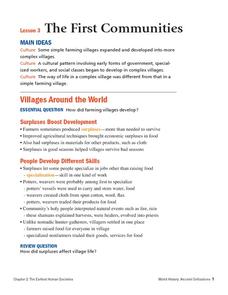Center for History Education
The Iran Hostage Crisis
While the Iranian Hostage Crisis was a watershed moment, few history classes take on the complex series of events leading up to it. Using declassified documents, including a hostage's diary, young historians create their own reports to...
Center for History Education
Debating Social Security: Understanding and Evaluating the Social Security Act of 1935
With throngs of Americans out of work and hungry, Franklin D. Roosevelt made the bold move to establish a social safety net with programs such as Social Security. The move was—and still is—controversial. Using documents from the 1930s,...
Center for History Education
The Freedmen's Bureau: Success or Failure?
What is freedom? The United States grappled with the question at the end of the Civil War after four million enslaved people were freed. Using circulars and images from the Reconstruction period, individuals examine how successful the...
Center for History Education
Daily Lives of Slaves - What Really Happened?
The stories of enslaved people are preserved forever thanks to the Great Depression. Budding historians explore slave narratives gathered by a federal government initiative to discover what life was actually like for enslaved people....
National Endowment for the Humanities
Creating the Office of the Presidency
The United States needed an executive power, but it wanted to avoid a monarchy. Using James Madison's notes on the Constitutional Convention, young historians look at the juggling act the Founding Fathers did to create a role for the...
National Endowment for the Humanities
The Question of Representation at the 1787 Convention
While the Constitution is considered enshrined today, its current form is the result of haggling at a secret convention in 1787. Using transcripts from the meetings and various plans as drafted by the delegates, class members unpack the...
National Endowment for the Humanities
The Road to the Constitutional Convention
After defeating the most powerful nation in the world, the United States had to deal with its own weaknesses in the Articles of Confederation. Activities in the activity include analyzing primary sources from the Founding Fathers to...
Constitutional Rights Foundation
What Should the US Do About North Korea's Nuclear Weapons?
North Korea, a shadowy nation distrustful of America, is working on a nuclear weapons program. What should the United States do? The question has plagued American presidents for years, but now young scholars get to make their...
Stanford University
King Philip's War
King Philip's War was the crescendo of a violent period between the Pequot and English colonists. Using documents from English settlers, including a contemporary report on the conflict, learners explore the little-known period. They then...
Stanford University
Boston Massacre
The Boston Massacre was a propaganda victory for those protesting British rule over the American colonies. By using images from Patriots, as well as the testimony of witnesses, scholars consider what may have happened on that fateful day...
iCivics
DBQuest: The Nashville Sit-In Movement
What was it like to be a part of the sit-ins during the Civil Rights Movement? Learners consider the question and whether the protests were effective using an online documents-based investigation. The program allows for virtual...
Cuban Revolution
The Cuban Revolution and Its Impact on Latin America
Fidel Castro was the iconic leader of Cuba. Yet, individuals may know little about the man or his motivations. In an engaging Web quest activity, scholars investigate Castro's political aspirations and his more ephemeral personal life...
Cornell College
Dred Scott v. Sandford Supreme Court Decision
Dred Scott was a harbinger of the Civil War. An enslaved man claimed freedom because his owner had taken him into free territory. Not only did the Supreme Court rule that Dred Scott and his wife were to remain enslaved, but it also ruled...
American Psychological Association
Developing Adolescents
Why to young people act the way they do? Scholars investigate the stages of adolescent development incorporating high school psychology techniques. Using research from the American Psychological Association, they uncover the five areas...
American Psychological Association
How Psychology Benefits Society
How do people form their opinions about certain social issues? Scholars research current global issues to find out how psychology plays a role in swaying thoughts. Using blogs, writings, and presentations, they uncover why people think...
Student Handouts
Guy Fawkes Night
What happened on the fifth of November that has prompted an annual, national commemoration in Great Britain? Young historians look at a traditional English rhyme and folk tale from the seventeenth century that...
Michael Hunter and Fiona Kisby
Robert Boyle and Medical Reform in the 17th Century
Introduce pupils to the work of Robert Boyle and his influence on medical practice through a series of informational texts and discussion questions.
University of Chicago
Ancient Egyptians and Death
What archaeological evidence remains of ancient Egyptian burial and mortuary practices, and what can this information tell us about ancient Egyptian society?
Curated OER
How was the Constitution Used to Organize the New Government?
How did the United States Congress determine how the new president and vice president would be named when the nation was first established? Who would provide money for the government, and how would the executive branch be organized?
Center for Civic Education
Responsibility and the U.S. Constitution
When are responsibilities freely chosen, and when have they actually been imposed on us? Here you'll find a unique way to frame your class discussion on civic duty and responsibilities inherent in the United States Constitution.
Polk Bros Foundation
Analyze History
Determining the central idea of a historical event or theme involves identifying key points of information, such as the people and place involved in the history, challenges faced, and choices made. Your young historians can use this...
Polk Bros Foundation
Topic Report Learning Organizer
If you'd like to quickly access a simple graphic organizer designed for a class to divide and conquer a larger subject, then check out this resource. Assign class members to study a specific topic within a historical theme or event, and...
Polk Bros Foundation
I Can Identify and Support the Main Idea in Non-Ficiton
Analyze a historical or scientific informational text by determining the main idea and supporting details. This graphic organizer allows pupils to write down the main idea and four details.
Houghton Mifflin Harcourt
The First Communities
These documents list essential questions and foundational concepts associated with early civilizations and farming communities in the agricultural revolution. Use this as a starting point for developing specific lessons and activities...


